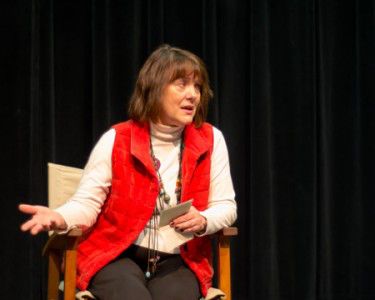
About 40 Boston University staff and faculty members gathered in the Playwrights’ Theatre on Wednesday to listen to stories and advice from Kate Snodgrass, the artistic director of Boston Playwrights’ Theatre.
Snodgrass also co-founded and directs the Boston Theater Marathon and runs BU’s Master of Fine Arts Playwriting Program.
Natalie McCracken of BU’s Women’s Guild invited Snodgrass to explain what goes on in the Theatre and to speak to current and potential members of the Women’s Guild at a luncheon.
“If you’ve never worked backstage, you don’t know what ‘going-wrong’ means,” McCracken said.
Snodgrass spoke about the history of the Theatre and shared some anecdotes about working with theater.
The Theatre began in 1981 under the initiative of Derek Walcott, a BU professor of both playwriting and poetry, Snodgrass said.
“BU, in its infinite wisdom, gifted Derek with this space for a Playwright Theatre,” Snodgrass said. “He began to produce new plays in this space, rather than the classics.”
Snodgrass explained how she chooses which plays to run since she was appointed the Theatre’s the artistic director.
“We loan out this space for little theater companies and for new work to come in,” Snodgrass said. “That’s really our mission here – to be open to the community and be a forum for new scripts and ideas under the umbrella of Boston University.”
She said she believes that it is important for students to learn how to take a character and make it their own.
“Actors are the heart and soul of the theater,” Snodgrass said. “They bring it alive. Using new works, they have the chance to build the character from the ground up.”
When producing a play, or “professional workshop productions,” Snodgrass said she has to learn to adapt to the writer’s vision as well as work with the actors.
“I’m learning how to do this,” Snodgrass said. “I bring my own baggage and opinions. I’m not fond of nudity, for example. When there is a naked actor on stage all you can think about is ‘Whoa, that actor is naked and I’m in the same room as him.’”
Even though she said some artistic aspects are unnecessary, she said she believes she must follow the writer’s vision.
Laughing to herself, Snodgrass told a story about a time when a whole show was improvised because the main actor did not know her lines.
“Plays are malleable, they are clay that can be molded and changed,” Snodgrass said.
The improvised play worked out well, showing the trust between the writer, actors, director and audience, Snodgrass said. “That’s what I want to happen all the time, a collaboration between the artists, actors, directors and writers.”
When she asked the audience who had ever been to this theater before, most of the attendees raised their hands.
However, Snodgrass said there has been a major issue in attracting audiences to the small, black box theater in West Campus.
Some audience members said they forget to keep up with the theater.
“I knew about it, but I’ve been pretty oblivious about things going on here,” said Marisa Pond, who works in design and print communications for BU.
Ruth Ciolfi, recording secretary of the Women’s Guild, said the Guild is an organization for BU’s female staff and faculty that acts as a forum for women across campus.
“Each month we hold these lunch and lectures,” Ciolfi said. “Our primary goal is to raise money for a scholarship for BU women in graduate programs.”
This is an account occasionally used by the Daily Free Press editors to post archived posts from previous iterations of the site or otherwise for special circumstance publications. See authorship info on the byline at the top of the page.



